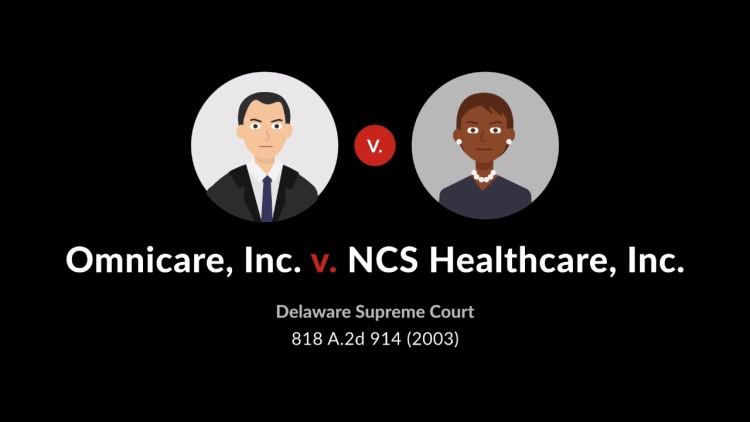Omnicare, Inc. v. NCS Healthcare, Inc.
Delaware Supreme Court
818 A.2d 914 (2003)

- Written by Sean Carroll, JD
Facts
Genesis Health Ventures, Inc. (Genesis) (defendant) entered into negotiations to acquire NCS Healthcare, Inc. (NCS) (defendant). At the urging of Genesis, the parties entered into an exclusivity agreement, which prevented NCS from engaging in any negotiations in regards to a competing acquisition or transaction. Subsequently, Omnicare, Inc. (plaintiff) contacted NCS about a proposed transaction. NCS did not respond due to the exclusivity agreement with Genesis, but NCS did use Omnicare’s proposed transaction to negotiate more favorable terms with Genesis. Complementary to Genesis’s merger proposal was a voting agreement under which Jon Outcalt, chairman of the NCS board, and Kevin Shaw, NCS president and CEO, agreed to vote all of their shares—combined, a majority of NCS shares—in favor of the merger agreement. This voting agreement effectively meant that NCS shareholder approval of the merger was guaranteed even if the NCS board did not recommend its approval. The merger agreement, which contained a clause restricting the rights of NCS to discuss an alternative merger with a third party, was then executed. The merger agreement did not contain a fiduciary-out clause, which would have given the NCS board the opportunity to opt out of the agreement if it needed to do so to discharge its fiduciary duties to the corporation. Meanwhile, before the official—although futile—NCS shareholder vote on the Genesis merger proposal, Omnicare submitted a merger proposal that was superior to that of Genesis. At that point, the NCS board withdrew its recommendation that the shareholders vote in favor of the Genesis merger agreement. However, the Genesis merger agreement provided that the proposal still must be submitted to a shareholder vote, and because of the Outcalt/Shaw voting agreement and the omission of a fiduciary-out clause, that meant that the merger agreement was going to be approved no matter what. Omnicare brought suit.
Rule of Law
Issue
Holding and Reasoning (Holland, J.)
Dissent (Steele, J.)
Dissent (Veasey, C.J.)
What to do next…
Here's why 904,000 law students have relied on our case briefs:
- Written by law professors and practitioners, not other law students. 47,100 briefs, keyed to 995 casebooks. Top-notch customer support.
- The right amount of information, includes the facts, issues, rule of law, holding and reasoning, and any concurrences and dissents.
- Access in your classes, works on your mobile and tablet. Massive library of related video lessons and high quality multiple-choice questions.
- Easy to use, uniform format for every case brief. Written in plain English, not in legalese. Our briefs summarize and simplify; they don’t just repeat the court’s language.





